Art
Tate Exchange
Thomas Tallis School is proud to be one of the Tate Exchange Founding Associates. The new Switch House at Tate Modern devotes a whole floor to a new experiment in audience engagement called Tate Exchange.
As an Associate, we are responsible for planning and delivering two days of programming in this space, reflecting our commitment to learning through art. Over recent years we have developed a close relationship with colleagues at Tate, which has had a direct impact on the quality of art education we can offer our students.
Our Tate Exchange projects will help us further refine our thinking about art education and give us an opportunity to share what we have learned with a range of visitors, including members of the public. The theme of this year's programming is, not surprisingly, Exchange. We will be directly involved in Tate Exchange for the next three years.
Our Projects: (I) Tate Exposed
A photographic peek behind the scenes at Tate Modern.
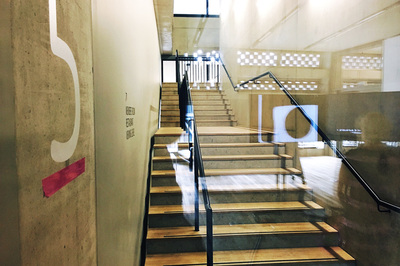
We are collaborating with St. Peter's School in Bournemouth on our first Tate Exchange project. Year 13 photographers from both schools will spend a day in December at Tate Modern documenting the building behind the scenes. They will explore those parts of the building that visitors ordinarily cannot reach: store rooms, the staff canteen, offices, corridors and cupboards. What lurks behind those pristine white walls of the galleries? Who works in the bowels of the building? Where do staff go for a quiet cup of tea?
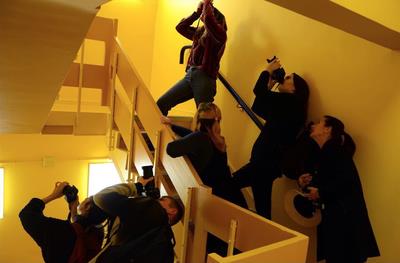
On 6th February 2017, the students will share their photographs with other photography students and members of the visiting public in the Tate Exchange space. They will offer visitors the chance to make a zine from their images, engage them in discussion about the big ideas in photography, encourage them to think about examples of photographs in the Tate collection and use their cameras to capture their experience with the help of some imaginative prompts. Visitors' photographs will be shared online and displayed live in the Tate Exchange space.
This project is an offshoot of the PhotoPedagogy website, a resource for teachers and students of photography in schools and colleges across the UK and beyond.
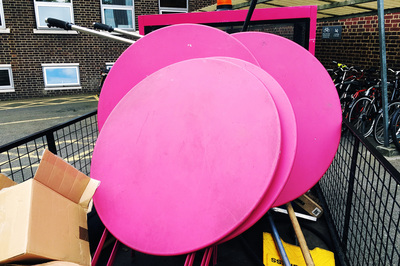
Our Project: (II) The Thomas Tallis Centre for Contemporary Art
"Everybody should have their own art gallery."
Can we make an art gallery from a garden shed? Inspired by Bob and Roberta Smith's Leytonstone Centre for Contemporary Art - a shed in Bob's garden - we want to transform an old plot of land with weed-infested raised beds and a rickety old shed into a garden and gallery for contemporary art. We are interested in the relationship between growing a garden, making art and nurturing a community.
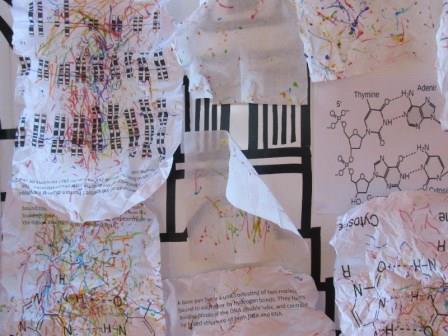
A group of Year 7 and 8 students at Tallis, who are supported by the Support Centre for Autism and Speech and Language Impairment, will design and make a sensory garden and a gallery over the next three years. As they both grow together we will document the process with photographs and film. We will experiment with a range of ways to make art about the garden, about growing and nature. We will transform the shed into a gallery, displaying work made by the students alongside a fantastic archive of images shared with us by Professor Helen Storey whose Field of Jeans was recently installed on the school grounds. We're hoping parents will get involved and that plants (and art) will be exchanged between home and school.
On 5th April 2017, our students will share what they have learned so far with invited guests from local schools and members of the visiting public in the Tate Exchange space on Level 5 of the Switch House. We will welcome visitors into a version of our shed gallery, containing some of the art works we have made, inviting them to plant their own art in our temporary garden. The film of the project will be available to view.
The Big Draw
Students and staff have been taking part in ‘The Big Draw’, an annual event and the world’s biggest celebration of drawing. We have been busy highlighting the importance and purpose of drawing and using it to help us think about who we are as a community.
Eileen Adams, an Educational Leader in the national campaign for drawing, believes that you can both ‘learn to draw’ and ‘draw to learn’. She says that there are four main purposes of mark making or drawing:
- Perception - personal view, understanding, observing, recording, analysing
- Communication - maps, diagrams
- Invention - designs, ideas, artworks
- Action - charts, plans, tables
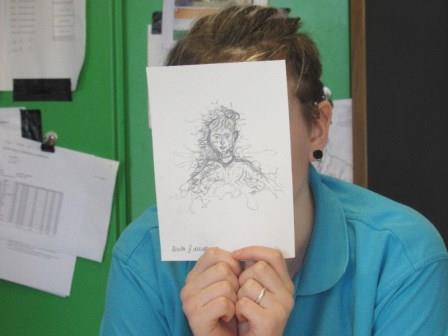
We agree with the campaign that visual literacy is important for young people and that is why our Art curriculum starts with a focus on mark making and drawing in all years. It activates parts of the brain that words and numbers don't and helps us to make connections. We have been reminding ourselves that it is hard to imagine a world without drawing. Somebody somewhere has drawn everything that we use, from road markings and maps to our toothbrushes and mobile phones.
The highlight of the week was when 40 Year 9 and 10 students ran a drawing workshop in the Visual & Media Arts corridor for Year 7 students during lunch. We will be continuing this line of inquiry over the coming weeks so watch this space.
Music
The Music department at Thomas Tallis is a vibrant faculty to be part of. The department offers KS3 Music in Year 7 and 8 followed by a three year KS4 course in GCSE or BTEC Level 2 Music. Music is also popular in the Sixth Form with A Level Music and BTEC Level 3 having successful uptake and results of 100% A*-C.
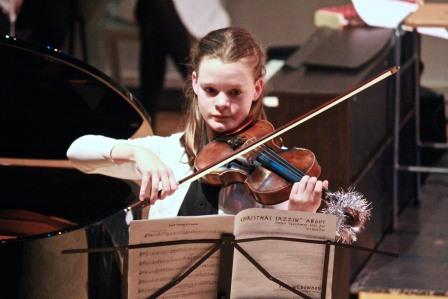
At Tallis we aim to develop confident and bold musicianship across different genres and eras. Classes are encouraged to be practical based, with students playing, singing, composing or using technology in every lesson. Our Music staff includes professional composers, performers and musical directors with extensive experience of working in the UK music industry. Between them, our faculty members have developed new works in conjunction with the BFI and the BBC, and have achieved No. 1 success in the commercial charts. Our students greatly benefit from this knowledge of what it is like to excel in the music industry. We urge our BTEC students to produce and promote their own concerts, and we push their ensembles to excel. We challenge our composers to create inspired new works grounded in the history and development of western composition. And, we encourage collaboration with peers across the Performing Arts department in order to stretch their musicality and push their limits. Our students are high-quality, and they create diverse, high-quality music in turn.
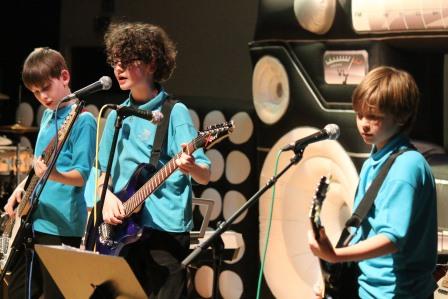
With a Ukulele club, the Tallis Singers, Computer Music, a Tallis Orchestra, Music Theory club, Keyboard Orchestra, several Guitar Groups and at least one band in every year group - extra-curricular music is thriving at Thomas Tallis. Having experienced instrumental and vocal specialists among our full time and peripatetic teaching staff enables us to offer extremely high-quality guidance for any musical activity the students can think up. Aside from being an environment for musical growth, the Music department is also the nerve-centre for an ever-increasing community of young musicians who take over our rooms at every opportunity.
In 2015, our principal classical guitar group became the flag-ship guitar group for the Greenwich Music Hub, and in October 2015, 21 extremely excited Tallis orchestral musicians performed with the BBC Concert Orchestra for the BBC Ten Pieces series, with the event being broadcast live to BBC Radio 4 from the main hall at Tallis. Summer 2016 saw a mammoth production of We Will Rock You, which was entirely extra-curricular and included over 50 students. This is just the tip of a very large iceberg of concerts that take place at Tallis.
At Tallis we encourage independence amongst our young people and although teaching staff are always on hand to guide and supervise musical activities, it is the students that run the show - organising rehearsal times, choosing repertoire, arranging their rehearsal times and breathing life into Tallis music. Long may they reign.
Peripatetic teaching staff not only run individual lessons but assist within classes too. Many students work towards graded examinations and record high quality performances in the recording studio or in half termly performances.
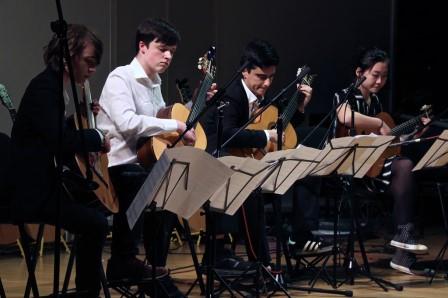
English
The English department at Thomas Tallis has lots planned for students which goes beyond the classroom and curriculum, including extracurricular clubs, theatre trips and guest speakers.
All tutor groups are currently reading a classic text in tutor period with their teacher. Year 8 students are shadowing the Carnegie Medal children’s books by reading each of the shortlisted texts and meeting to discuss them in class.
A number of trips have been planned for students in the coming months. In a few weeks we will be taking all of Year 7 to see A Christmas Carol at the Woolwich Theatre, whilst 200 Year 11 students will see the acclaimed Stephen Daldry production of An Inspector Calls. A group of Year 10 and 11 students will be going to a Poetry Live event in Central London which will feature many of the most celebrated poets working today. Our A Level students will be attending a series of lectures run by academics at Greenwich University focusing on key movements and themes in literature.
We have invited author Vanessa Altin to come and speak to Year 9 students about her recent book, The Pomegranate Tree, which is based on a true story of a young Kurdish girl whose life gets completely changed by the Syrian conflict. We have also just launched a Year 11 girls book group starting with White Teeth by Zadie Smith and we are hoping that many of them will attend a session with journalist turned author Vanessa Altin.
Leadership
The PTI project undertaken at Thomas Tallis School is big. When I say big, I mean really big.
It is also unfortunately, very long term, slightly ephemeral, almost untestable and likely to cause both us, and the Institute, a huge headache when completing paperwork! However, it also cuts to the very heart of education, aims to break our intervention ‘ceiling’, whilst generating a renewed enthusiasm, respect and pedagogical inspiration amongst our colleagues.
Our Schools Leadership Programme project is entitled “Developing true learning habits and powerful knowledge” and has resulted in numerous visioning meetings with staff, restructuring of schemes of work, re-evaluation of the curriculum, brand new assessment systems, and alteration to the performance management of all staff.
Examples of what has already been started include:
- A growth mindset reporting system where students are judged on their effort towards our ‘habits'
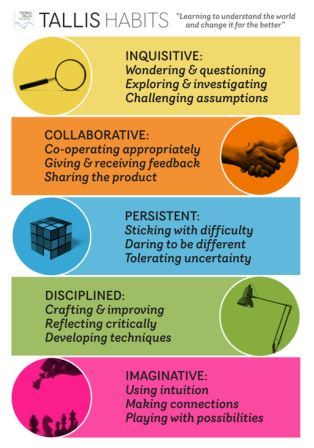
- All teaching staff having action research projects focused on 'habits’ and linked to performance management targets
- Development days fronted by leading international educational thinkers such as Bill Lucas
- New lesson observation and planning approaches for the school including our habits and powerful knowledge
- A new rewards system and online app focused on encouraging good ‘habits'
- A restructuring of our whole curriculum looking at a “building backwards” approach from Year 11 to Year 7, with powerful knowledge, 'mastery' and big ideas at its heart
- The introduction of extended enquiries that develop independence and take students beyond the curriculum
- 'Community days’ built around our habits of mind and focused on depth and excitement
Whilst ambitious, it shows a commitment to real education and a bravery to take a long-term view of success in what is often a very short-term, accountability-driven environment.
Leadership project update:
When we started this project, we knew it was both big and long term. However, it has proven even more challenging than we thought. This is where we have got up to as of November 2016:
- Our reporting system has been evaluated and updated. Staff found it hard to distinguish between some of the habits in terms of effort, so we have scaled this back to one a term. Students and staff, however, like the focus on effort.
- The rewards system has been brought in for the whole school and is focused on effort in home learning and in class. This was helped by bringing in PARs and insight – an online MIS system that is accessible by parents. Students receive reward comments viewable by parents, postcards and head teacher letters home for reaching certain numbers of points, form prizes and ‘tea and cakes’ with the head teacher for the most rewarded students in each form.
- Our learning habits have become more than posters and website publicity. We now have a habits app, a habits-based rewards system, habits appearing on our observation and learning walk forms as well as being written into schemes of work and lesson planning. However, we have since gone further and decided that ‘character’ is equally important to develop in young people. So we are currently working on developing character traits that encompass our school ethos.
- As part of redesigning Key Stage 3, we gave over a significant amount of development time to consider our ‘thresholds’ for learning and build these into our schemes of work. These are currently under review, but are intended to encourage the understanding of powerful knowledge and to develop a mastery approach to education.
- We have established three community days a year which are built on the habits principles. These will have a unifying theme and will often be cross curricular, and sometimes cross year groups. Our last was focused on power and justice. The next one will be focused on debating and will lead into us hosting the World Scholars Cup for the London region in January.
- We have introduced some extended enquiries, although this is a work in progress. We are currently considering expanding these in terms of year groups and to focus on ability ranges.
Thomas Tallis School is a large mixed comprehensive school for pupils aged 11–19 with a Sixth Form centre, located in Kidbrooke, south-east London.
